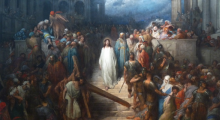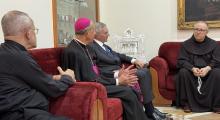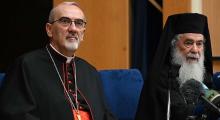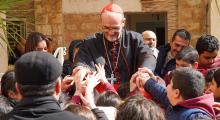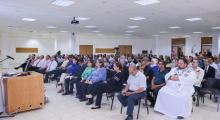Issued by the Catholic Center for Studies and Media - Jordan. Editor-in-chief Fr. Rif'at Bader - موقع أبونا abouna.org
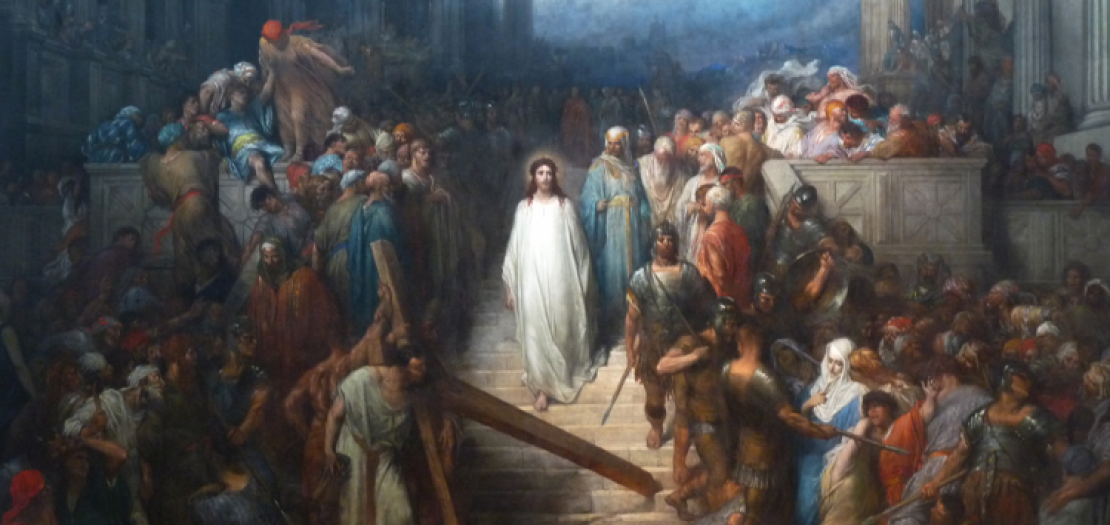
Following is the text of the meditation by His Beatitude Cardinal Pierbattiasta Pizzaballa, Latin Patriarch of Jerusalem, on the 32nd Sunday of Ordinary time, dated September 4, 2025:
The central theme of today's Gospel passage (Luke 14:25–33) focuses on following the Lord, being his disciples, walking with Him.
The passage begins by noting that a large crowd was traveling with Jesus, (Luke 14:25) and then recounts His words to those who came to Him and wished to be His disciples. (Luke 14:26–27)
As Jesus walks toward Jerusalem, seeing the great crowd following Him, He speaks with clarity and strength, for to follow Him is to share in His mission and to be led to His ultimate goal.
The first element we pause on concerns the verb “to sit down,” which appears in both of the short stories that Jesus tells: whoever wants to build a tower first sits down to see if he has the means, (Luke 14:28) and whoever wants to go to war against someone sits down to see if he has enough resources.
Just as the verb “to sit down” appears twice, so also the expression “to bring to completion,” “to finish the work” (Luke 14:28–30) appears multiple times.
One sets out to walk behind the Lord, but for this journey to reach completion, for the work to be fulfilled, one must sit down, stop.
But why must this be done?
Because to discipleship is a new beginning, a new departure.
It is something that changes your life, and you are no longer the same as before.
Above all, your priorities change, as we already saw in last Sunday’s Gospel: those who follow the Lord, those who go with Him to Jerusalem, can no longer lose themselves in the pursuit of personal glory, of fleeting values.
This profound interior change is expressed today through a new way of living family relationships. Jesus clearly says that whoever follows Him must hate their own family and even their own life. (Luke 14:26) What does this mean? Why?
We become new persons when walking behind Jesus, for life is, above all, a relationship with the Lord. What defines us is not merely our origins or traits, but our drawing near to Him, being renewed through His death and resurrection. Everything else follows.
This carries a profound meaning: the ways of thinking, acting, and living that each person has inherited from their culture and family give way to a new way of thinking—the way of the Gospel. From this, a new identity is born.
It also means that all that tradition, which at times can keep us bound to an old and sterile way of life, can give way to a freedom of life founded on a love that is free, universal, and unbound.
It also means that the world of security we derive from belonging to a family or clan opens up to a broader sense of belonging, one that offers no guarantees or privileges, but opens the door to the banquet of the Kingdom.
To go with Him, to follow Him, therefore does not require any particular means or special abilities.
If that were the case, many of us would be excluded.
On the contrary, to follow the Lord, we simply need to make space, let go, cut ties with all that keeps us chained to an old mentality.
And this too is a gift, which the Lord gives to those who sit down and await from Him the grace of a new beginning.
One final reflection: this distancing from the family does not mean contempt or rejection of our loved ones.
It means that what we can count on, ask of, depend on, and find refuge in is no longer primarily the family world, but what comes from belonging to the Lord and the community of faith.
It is a matter of leaving behind an old way of loving, based on family ties, to a new, broader, and universal love, so that a new family may emerge, in which we care for one another.
+Pierbattista


